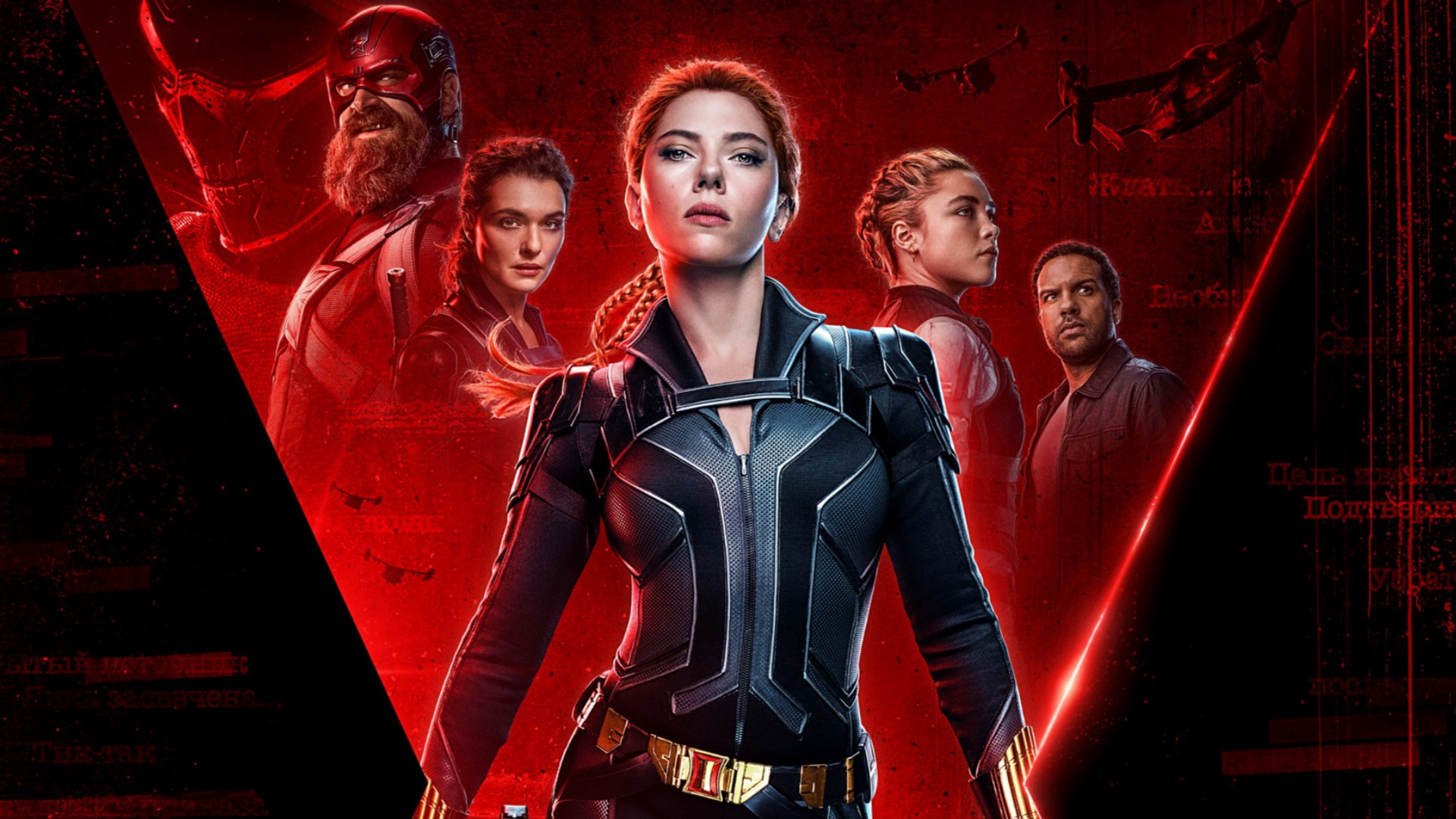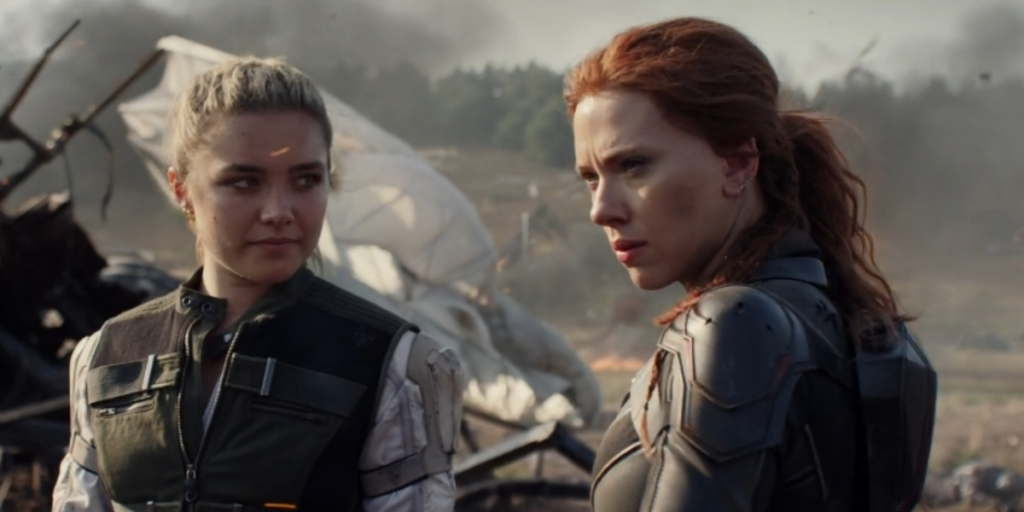
The Black Widow movie has been so long overdue (both because of the pandemic and Marvel’s crowded forecasting) that everything about the film screams of being a late arrival. It’s not just that the story takes place directly after the events of Captain America: Civil War (2016) or that it takes place before her demise in Avengers: Endgame. It feels like such a movie should’ve been sooner rather than later considering the expanded past of her character comes off more like an afterthought. The good news is that for being a side story, Black Widow manages to be a tactile and surprisingly engaging spy thriller.
Natasha “Black Widow” Romanoff (Scarlett Johansson) finally gets a chance to breathe in a film where her past is not relegated to casual talk with Hawkeye or haunted visions from Scarlett Witch. The Red Room, a secret organization that had trained her since childhood, comes back into her life as she goes on the lam. We learn of her secret history involving her parents being Russian spies as well as her missing sister, Yelena Belova (Florence Pugh). Yelena pops back into Natasha’s purview when the Red Room becomes a more attainable target. Their adventure to bring down this shadow operation finds them seeking the intel of their parents, the washed-up super soldier Alexei “Red Guardian” Shostakov (David Harbour), and the cunning scientist Melina Vostokoff (Rachel Weisz).
It should come as no surprise that the Red Room’s leader is a power-hungry manipulator, going by the one-name handle Dreykov (Ray Winstone), but the film keeps him a tad more interesting by highlighting his petty desire for power and taking advantage of helpless women to be his mindless soldiers. Black Widow’s mission becomes more personal with more on the line than just another bad guy desiring world domination. The message of trying to stress how Black Widow tries to make more allies of the damaged than succumb to the whims of the puppetmasters is very blunt by the third act but, hey, when was the Marvel Cinematic Universe known for subtlety on such topics?
Unlike Marvel’s more recent spy thriller of The Falcon and The Winter Soldier, Black Widow sets goals that are much easier to attain and nails its targets with far more accuracy. Where that show tried to untangle the issues of borders and refugees with a we-can-do-better speech, this film recognizes Natasha’s war against social oppression and human trafficking as one without end and is a fight that will never stop. Even by the climax of the film, where it seems as though she breaks the neural shackles of the manipulated, she and her sister are aware that there will always be another Red Room and it won’t require a James Bond villain-like Dreykov or fancy tech for mind-control.
The other thematic element that has its ups and downs is the aspect of the family. While Natasha and Yelena connect rather well as they had been tearfully pulled away as kids, Alexei and Melina are parents they don’t recognize, considering they were nothing more than a ploy for a Russian spy program. They grew up in Ohio under false pretenses and were lied to by their own parents, shoved into the inhuman training program of the Red Room.
It makes their encounters with their folks more than a little awkward. Alexei is posed more as a comic relief character considering his glory days are behind him, struggling to fit into his corny Red Guardian costume that doesn’t quite wrap around his beefy build. The sisters are also dismayed that their mother speaks so casually about their mission and her technology, thinking little of the fact that she’s developing tech that can literally stop breathing from within.
Their dynamic is a mixture of gallows humor and relatable family issues, becoming all the more familiar when the four of them sit down to a dinner that is sure to conjure memories of heated Thanksgivings for many viewers. These scenes are stellar considering Natasha and Yelena get to be more heroic by standing up to their parents who have shown they are weaker for going along with such a fascistic organization that has split them apart rather than rally against it. Alexei, struggling to be the dad he didn’t want to be, tries to argue that the upbringing of the girls made them strong. They can easily counter such handwaves in conversation by bringing up in great detail how the Red Room gave them painful hysterectomies.
Johansson gives her usual snark as the action-ready Black Widow but she’s also allowed to be more of a bruised-arm hero in this picture. She gets her arm broken, her neck choked, and her face pummeled until she’s bruised and bloody. In one of the more brutal moments, she forcefully breaks one part of her body to cleverly get the upper hand on the villain.
Florence Pugh really stands out in this film the most as both the comic relief and voice of reason. In her many exchanges with Johansson, she brings up how ridiculous her superhero pose looks but also becomes a bit curious as to how to perform it herself. She makes a lot of commentary on finding cool ways to die yet she also brings up interesting angles on how someone like Black Widow gets to be an Avenger despite Yelena knowing more of Natasha’s sordid history that is far from heroic. I know that David Harbour is mostly present as comic relief but, sorry, he doesn’t hold a candle to Pugh who can so effortlessly garner a laugh.
Not all of Black Widow manages to hit the sweet spot of a political thriller. Aside from random Black Widow agents and masked soldiers, the titular hero’s costumed villain for this picture is Taskmaster, a mysterious figure who can duplicate fighting styles. The design of Taskmaster is fairly uninspired, boasting a skull-shaped helmet, patchwork armor, and an off-brand Captain America shield. The grand reveal of just who the Taskmaster happens to be also isn’t a twist if you’re putting the puzzle together as you go. In order to keep that mystery, however, the villain will never speak in the figure’s relentless hunt to quell a rebellion against the Red Room, the soundtrack vibrating every time the villain makes an approach.
Do I even need to bring up the action sequences that are stunning and elaborately staged? Everything from Natasha and Yelena’s mad-dash across Budapest rooftops to their daring escape from an exploding sky fortress is brimming with exciting shots and stunts. The close-quarters battles are not too shabby with Johansson and Pugh showcasing fast-paced moves at outsmarting their opponents, best showcased when they first meet and duel each other before a truce is formed. Even the heavy use of special effects, as when Natasha and Taskmaster have a battle while descending through a sky of wreckage, look decent enough that the physics don’t feel as awkward in previous Marvel movies where an abundance of visual effects are required just to get a character on the screen.
Black Widow is not going to shake the foundations of the Marvel Cinematic Universe but it pleases in its own standalone way. This may not be the rousing charge into Marvel Studios’ Phase IV considering it’s not only backtracking on a previous hero but commits itself to be as distant from the rest of the universe as possible. This film is certainly not going to welcome in newcomers or naysayers either, considering how much of the MCU lore it draws upon with little to no flashbacks. As it stands, this little detour stands on firm enough ground to be a satisfying action-thriller, occasionally finding the sweet spot of family and power dynamics amid bullets, fists and clever spy tech.

 “My Spy: The Eternal City” Review
“My Spy: The Eternal City” Review  “Deadpool & Wolverine” Review
“Deadpool & Wolverine” Review  “The Boys: Season Four” Review
“The Boys: Season Four” Review  “The American Society of Magical Negroes” Review
“The American Society of Magical Negroes” Review  “Twisters” Review
“Twisters” Review  “Sausage Party: Foodtopia” Review
“Sausage Party: Foodtopia” Review  “Robot Dreams” Review
“Robot Dreams” Review  “Godzilla x Kong: The New Empire” Review
“Godzilla x Kong: The New Empire” Review 



